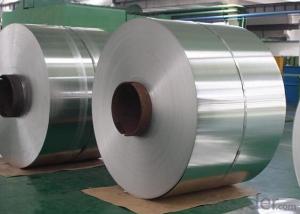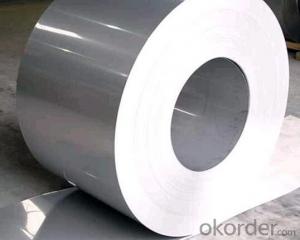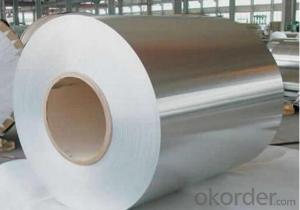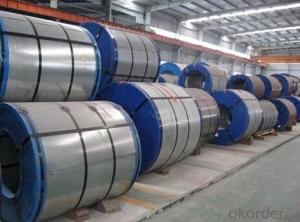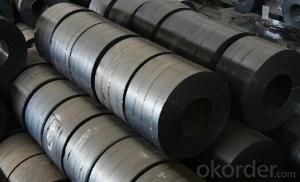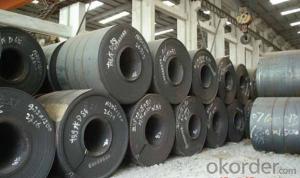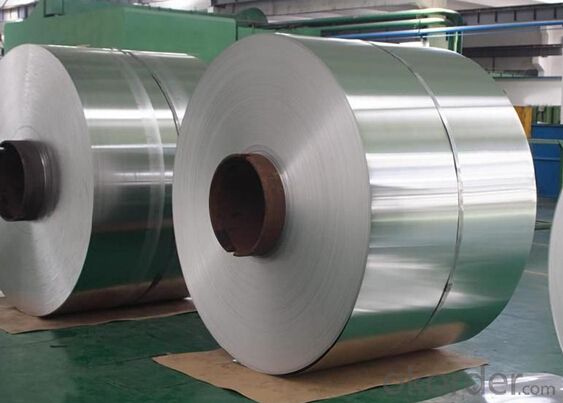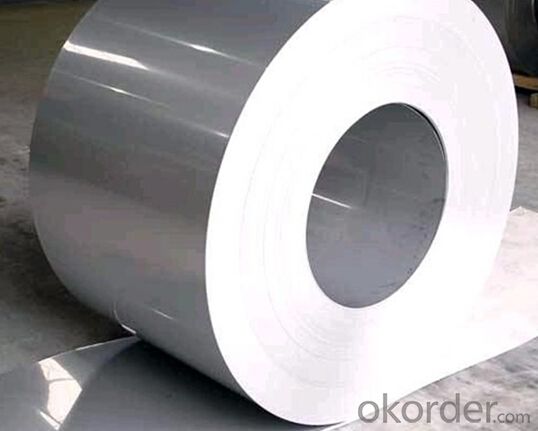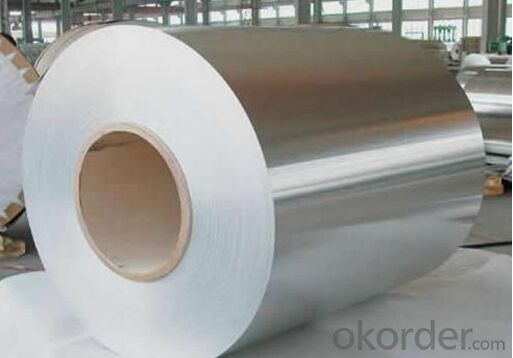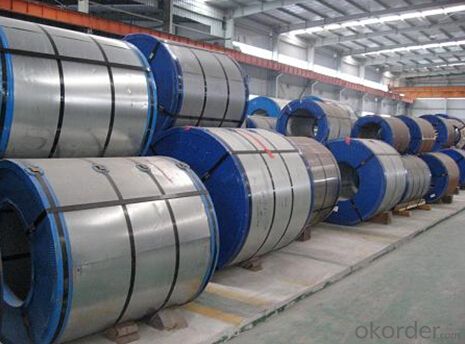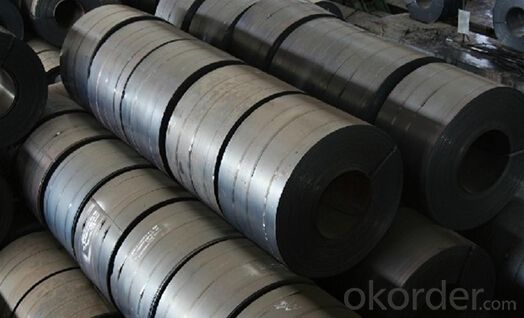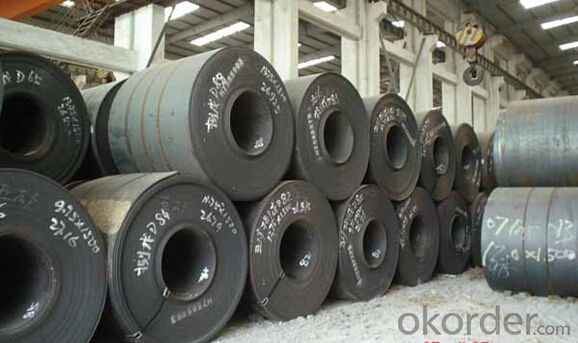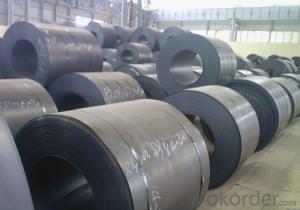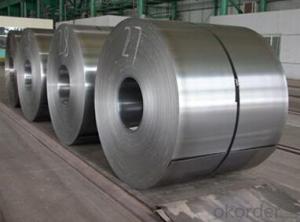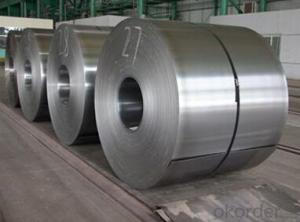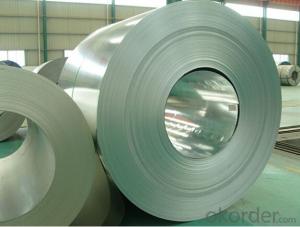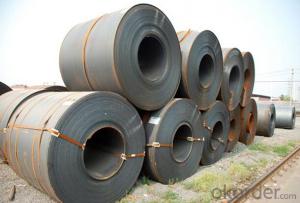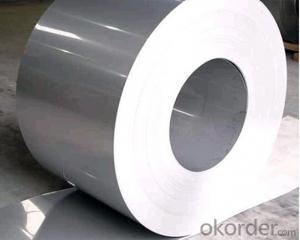Grade S250GD-S550GD Galvanized Steel Coil
- Loading Port:
- Tianjin
- Payment Terms:
- TT OR LC
- Min Order Qty:
- 3 m.t.
- Supply Capability:
- 10000 m.t./month
OKorder Service Pledge
OKorder Financial Service
You Might Also Like
Specification
Grade S250GD-S550GD Galvanized Steel Coil
Specification of Grade S250GD-S550GD Galvanized Steel Coil
1. Galvanized Steel Coil
(1) Width: 600-1570mm
(2) Thickness: 0.13-5.0mm
(3) Grade: JIS G3302-SGCC-SGC570, SGCH (full hard-G550), SGHC-SGH540
EN10346-DX51D+Z, DX53D+Z, S250GD-S550GD
ASTM A653-CS-B, SS255-SS550
(4) Zinc Coating: Z40g/m2~Z500g/m2 (both side total coating thickness)
2. Galvalume Steel Coil
(1) Width: 600~1500mm
(2) Thickness: 0.15~2.30mm
(3) Grade: JIS G3321-SGLCC, SGLC400-570, (G550)
EN10346-DX51D+AZ, DX53D+AZ, S250-S550
ASTM A792M CS-B, SS255-SS550
(4) AZ Coating: AZ50~AZ185g/m2
3. Prepainted Galvanized Steel Coil (PPGI)
(1) Width: 600~1250mm
(2) Thickness: 0.19~1.50mm
(3) Grade: JIS G3312-CGCC, CGC340-570, (G550)
ASTM A755M CS-B, SS255-SS550
(4) Zinc Coating: Z40g/m2~Z500g/m2 (both side total coating thickness)
4. Prepainted Galvanized Steel Coil (PPGL)
(1) Width: 600~1250mm
(2) Thickness: 0.20~1.50mm
(3) Grade: JIS G3322-CGLCC, CGLC340-570, (G550)
ASTM A755M CS-B, SS255-SS550
(4) AZ Coating: AZ50~AZ185g/m2 (both side total coating thickness)
5. Cold Rolled Steel Coil (Soft) (for further information, pls click the product name)
(1) Width: 600~1570mm
(2) Thickness: 0.13~2.50mm
(3) Grade: JIS G3141-SPCC-SD, SPCD-SD, SPEC-SD
JIS G3135-SPFC 340/390/440
EN10130-DC01, DC03, DC04
SAE1006, SAE1008
ASTM A424-TypeⅡ
6. Cold Rolled Steel Coil (Full Hard) (for further information, pls click the product name)
(1) Width: 600~1570mm
(2) Thickness: 0.13~2.50mm
(3) Grade: JIS G3141-SPCC-1B, SPCC-1D
7. Hot Rolled Steel Coil
(1) Width: 1000~1524mm
(2) Thickness: 1.20~16.5mm, other thickness can be negotiation
(3) Grade: JIS G3101-SS400, JIS G3132-SPHT1/2/3, ASTM A36, Q195, Q235 etc.
Company Introduction of the Grade S250GD-S550GD Galvanized Steel Coil
CNBM International Corporation is the most import and export platform of CNBM group(China National Building Material Group Corporation) ,which is a state-owned enterprise, ranked in 270th of Fortune Global 500 in 2015.
With its advantages, CNBM International are mainly concentrate on Cement, Glass, Iron and Steel, Ceramics industries and devotes herself for supplying high quality series of refractories as well as technical consultancies and logistics solution.
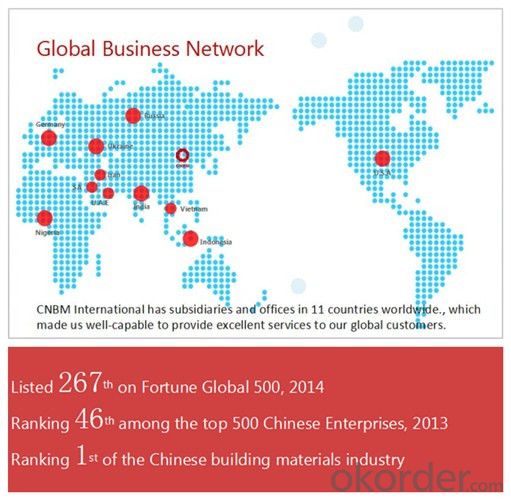
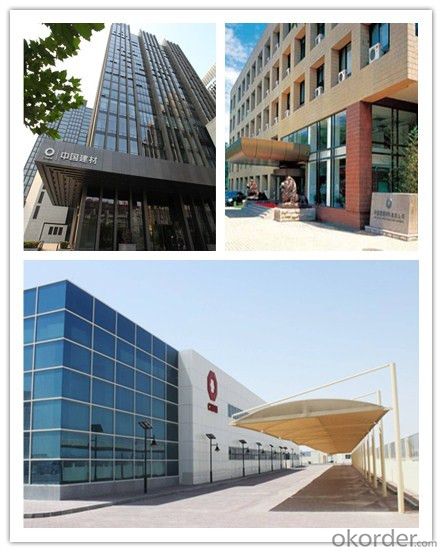
Packaging & Delivery of the Grade S250GD-S550GD Galvanized Steel Coil
Packaging Detail | Sea worthy packing /as per customer's packing instruction |
Delivery Detail | 15 ~ 40 days after receiving the deposit |
Products Show:
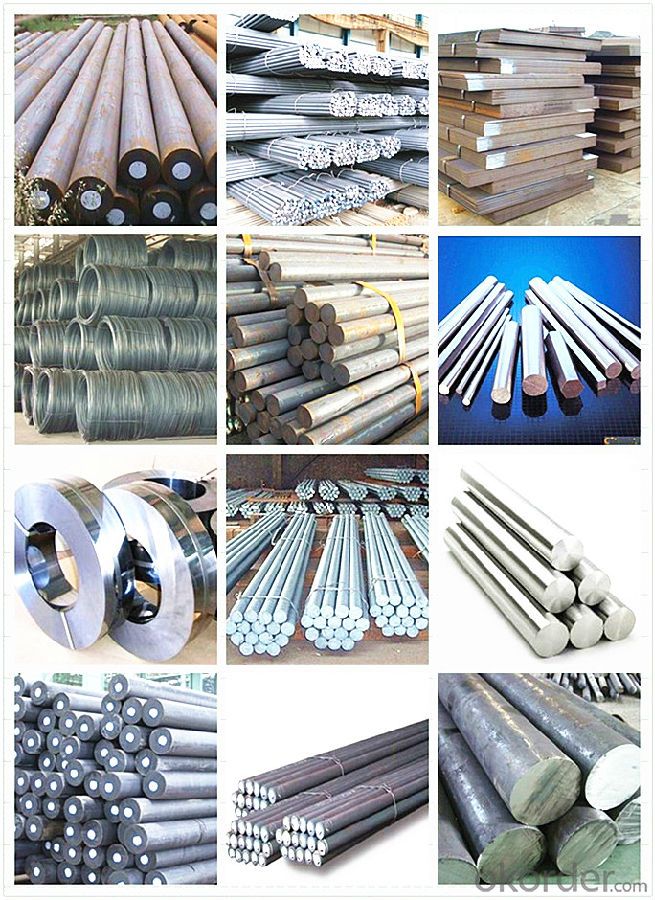
FAQ:
Are you a trading company or manufacturer? | Manufacturer |
What’s the MOQ? | 3 metric ton |
What’s your delivery time? | 15-35 days after downpayment received |
Do you Accept OEM service? | Yes |
what’s your delivery terms? | FOB/CFR/CIF |
What's the Payment Terms? | 30% as deposit,70% before shipment by T/T |
Western Union acceptable for small amount. | |
L/C acceptable for large amount. | |
Scrow ,Paybal,Alipay are also ok | |
Why choose us? | Chose happens because of quality, then price, We can give you both. Additionally, we can also offer professional products inquiry, products knowledge train (for agents), smooth goods delivery, excellent customer solution proposals. |
What's your available port of Shipment? | Main Port, China |
What’s your featured services? | Our service formula: good quality+ good price+ good service=customer's trust
|
Where are your Market? | Covering more than 160 countries in the world |
- Q: What are the different alloying elements used in special steel?
- Some of the different alloying elements used in special steel include chromium, nickel, molybdenum, vanadium, tungsten, and cobalt. These elements are added in varying amounts to enhance the steel's specific properties such as corrosion resistance, strength, hardness, and heat resistance.
- Q: How is special steel used in the packaging supply chain?
- Special steel is used in the packaging supply chain for various purposes such as manufacturing machinery, tools, and equipment needed for packaging processes. It is used to create durable and reliable components like blades, cutters, and molds, ensuring precise and efficient packaging operations. Additionally, special steel can be utilized for constructing robust packaging materials like containers, pallets, and racks, providing strength and stability during transportation and storage.
- Q: How does the composition of special steel affect its mechanical properties?
- The mechanical properties of special steel are significantly influenced by its composition. Special steel refers to a type of steel that has been altered or mixed with other elements to enhance its strength, toughness, hardness, and other desirable properties. The mechanical properties of special steel can be greatly affected by the addition of various alloying elements, such as manganese, chromium, nickel, molybdenum, vanadium, and tungsten. For instance, the inclusion of chromium can enhance corrosion resistance and hardness, making the steel more suitable for use in harsh environments. Manganese is often added to improve the steel's hardenability and tensile strength. Nickel can increase toughness and strength while maintaining good ductility. The specific mechanical properties of special steel can be achieved by adjusting the amount and combination of these alloying elements. For example, increasing the carbon content can boost the steel's strength and hardness, but it may reduce its ductility. Conversely, reducing the carbon content and introducing elements like nickel and molybdenum can enhance the steel's toughness and resistance to impacts. Moreover, the heat treatment process is crucial in influencing the mechanical properties of special steel. Techniques like quenching and tempering allow for the manipulation of the steel's microstructure to attain desired properties. Quenching involves rapidly cooling the steel to achieve high hardness and strength, while tempering helps reduce brittleness and improve toughness. In conclusion, the mechanical properties of special steel are determined by its composition, including the type and quantity of alloying elements, as well as the heat treatment process. By carefully selecting and controlling these factors, manufacturers can customize special steel to meet specific performance requirements for a wide range of applications.
- Q: How does special steel contribute to the aerospace structural industry?
- Special steel plays a crucial role in the aerospace structural industry by providing a range of important attributes that are necessary for the construction of aircraft components. Firstly, special steel offers exceptional strength and durability, allowing it to withstand the extreme conditions and stresses experienced during flight. This is particularly important for critical components such as landing gear, engine parts, and wing structures which are subjected to high temperatures, pressure, and vibrations. Furthermore, special steel possesses excellent corrosion resistance, which is vital for ensuring the longevity and reliability of aerospace structures. Aircraft are constantly exposed to harsh environments, including high humidity, saltwater, and chemicals, which can lead to corrosion and degradation if not properly protected. The use of special steel helps to prevent these issues, ensuring the structural integrity of the aircraft throughout its lifespan. In addition to its strength and corrosion resistance, special steel also offers other desirable properties such as heat resistance, fatigue resistance, and weldability. These characteristics make it suitable for a wide range of aerospace applications, including the construction of fuselage frames, engine mounts, fasteners, and hydraulic systems. By utilizing special steel in these components, aerospace manufacturers can achieve lightweight designs without compromising on strength and safety. Moreover, special steel enables engineers to push the boundaries of aircraft performance by facilitating the development of advanced technologies. For instance, the use of special steel alloys in turbine blades allows for higher operating temperatures, which in turn improves engine efficiency and reduces fuel consumption. This contributes to the overall sustainability and environmental friendliness of the aerospace industry. In summary, special steel is a vital material in the aerospace structural industry as it provides the necessary strength, durability, corrosion resistance, and other essential properties required for the construction of aircraft components. Its contribution allows for the development of safer, more efficient, and technologically advanced aircraft, ultimately benefiting the aerospace industry as a whole.
- Q: How does special steel contribute to the renewable energy sector?
- Special steel plays a crucial role in the renewable energy sector by enabling the development and production of efficient and durable components for renewable energy technologies. For example, special steel is used in the manufacturing of wind turbine towers, blades, and foundations, ensuring their structural integrity and longevity. It is also utilized in solar panel frames, supporting structures, and transmission systems, enhancing their resilience and performance. Additionally, special steel is essential in the construction of hydroelectric power plants, ensuring the strength and reliability of penstocks, turbines, and other critical components. Its unique properties and characteristics contribute significantly to the overall efficiency, sustainability, and cost-effectiveness of renewable energy systems.
- Q: What are the different welding methods used for special steel?
- There are several welding methods that can be used for special steel, depending on the specific requirements of the project. Some of the commonly used welding methods for special steel include: 1. Gas Metal Arc Welding (GMAW): Also known as MIG welding, this method uses a consumable electrode and a shielding gas to protect the weld from atmospheric contamination. GMAW is ideal for welding special steel as it provides high-quality, clean welds with minimal spatter. 2. Gas Tungsten Arc Welding (GTAW): Also known as TIG welding, this method uses a non-consumable tungsten electrode and a shielding gas to protect the weld. GTAW is often used for special steel as it allows for precise control over the welding process, resulting in high-quality, defect-free welds. 3. Shielded Metal Arc Welding (SMAW): Also known as stick welding, this method uses a consumable electrode coated in flux to protect the weld. SMAW is commonly used for special steel as it is a versatile and portable method that can be used in various positions and environments. 4. Flux-cored Arc Welding (FCAW): This method uses a tubular electrode filled with flux to protect the weld. FCAW is often used for special steel as it provides high deposition rates and deep penetration, making it suitable for thicker materials. 5. Submerged Arc Welding (SAW): This method uses a continuously fed wire electrode and a granular flux that is applied around the weld. SAW is commonly used for special steel as it can produce high-quality, high-integrity welds in thick sections. It is important to note that the selection of the appropriate welding method for special steel depends on various factors such as the type and thickness of the steel, the desired weld quality, and the specific application requirements. Therefore, it is recommended to consult with welding professionals or engineers to determine the most suitable method for a particular project involving special steel.
- Q: What are the main applications of special steel in the chemical industry?
- Special steel is extensively used in the chemical industry for various applications. Some of the main applications include the manufacturing of storage tanks, pipelines, and equipment that require resistance to corrosion, high temperatures, and pressure. Special steel also finds use in the production of catalysts, which are vital for many chemical processes. Additionally, it is employed in the construction of reactors, heat exchangers, and other critical components that require exceptional durability and reliability in harsh chemical environments.
- Q: How does special steel contribute to improving product safety?
- Special steel contributes to improving product safety in several ways. Firstly, special steel is known for its exceptional strength and durability, which enhances the structural integrity of various products. This ensures that they can withstand heavy loads, extreme temperatures, and other challenging conditions without compromising safety. Secondly, special steel often possesses excellent corrosion resistance, reducing the risk of product failure due to rust or degradation over time. Additionally, certain types of special steel offer high impact resistance and resistance to wear and tear, making products more resistant to damage and increasing their lifespan. Ultimately, by incorporating special steel into the manufacturing process, products can be made safer, more reliable, and longer-lasting for the benefit of consumers.
- Q: How does special steel perform in terms of hardness?
- Special steel is known to exhibit excellent hardness properties due to its unique composition and manufacturing processes. It is specifically designed to have a higher level of hardness compared to regular steel, making it extremely resistant to wear, abrasion, and deformation.
- Q: What are the environmental considerations associated with special steel production?
- Special steel production can have several environmental considerations due to its resource-intensive nature and the emissions generated during the production process. One of the main environmental considerations associated with special steel production is the extraction of raw materials. Special steel requires specific alloys and additives, which often involve the extraction of rare or valuable metals. Mining for these materials can have significant environmental impacts, including habitat destruction, soil erosion, water pollution, and the release of toxic substances. Another consideration is the energy consumption during the production process. Special steel production involves several energy-intensive stages, such as melting, refining, and shaping. These processes typically rely on fossil fuels, which contribute to greenhouse gas emissions and air pollution. Additionally, the high temperatures required for steel production contribute to significant carbon dioxide emissions, a major contributor to climate change. Water usage is also a concern in special steel production. The production process requires a substantial amount of water for cooling, cleaning, and lubrication. This can lead to water scarcity and pollution if not managed properly. The effluents generated during the production process can contain heavy metals, acids, and other pollutants, which can harm aquatic ecosystems if not adequately treated. Waste generation is another environmental consideration. Special steel production generates various types of waste, including slag, dust, and sludge. These wastes can contain heavy metals, toxins, and other pollutants. Proper disposal or treatment of these wastes is essential to prevent pollution of soil, water, and air. Lastly, the transportation of raw materials and finished products in special steel production can contribute to carbon emissions and air pollution. The long-distance shipping of raw materials and finished steel products can add to the overall environmental footprint of the industry. In conclusion, special steel production has several environmental considerations, including the extraction of raw materials, energy consumption, water usage, waste generation, and transportation. To mitigate these impacts, companies should prioritize sustainable sourcing of raw materials, invest in energy-efficient technologies, promote water conservation and treatment practices, manage and minimize waste generation, and explore cleaner transportation options.
Send your message to us
Grade S250GD-S550GD Galvanized Steel Coil
- Loading Port:
- Tianjin
- Payment Terms:
- TT OR LC
- Min Order Qty:
- 3 m.t.
- Supply Capability:
- 10000 m.t./month
OKorder Service Pledge
OKorder Financial Service
Similar products
Hot products
Hot Searches
Related keywords
